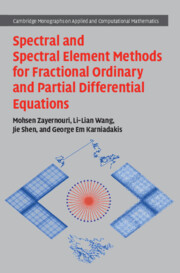Book contents
- Frontmatter
- Dedication
- Contents
- Preface
- Acknowledgments
- 1 Fractional Calculus and Anomalous Transport
- 2 Spectral Expansions and Related Approximations
- 3 Global Schemes for Fractional ODEs (FODEs)
- 4 Global Schemes for Fractional PDEs (FPDEs)
- 5 Integral Fractional Laplacian in Unbounded Domains
- 6 Fractional Laplacian in Bounded Domains
- 7 Time-Integration of Fractional Models
- 8 Applications of Anomalous Transport and Fractional Modeling
- References
- Index
7 - Time-Integration of Fractional Models
Published online by Cambridge University Press: 31 October 2024
- Frontmatter
- Dedication
- Contents
- Preface
- Acknowledgments
- 1 Fractional Calculus and Anomalous Transport
- 2 Spectral Expansions and Related Approximations
- 3 Global Schemes for Fractional ODEs (FODEs)
- 4 Global Schemes for Fractional PDEs (FPDEs)
- 5 Integral Fractional Laplacian in Unbounded Domains
- 6 Fractional Laplacian in Bounded Domains
- 7 Time-Integration of Fractional Models
- 8 Applications of Anomalous Transport and Fractional Modeling
- References
- Index
Summary
We present efficient time-stepping schemes for accurate and long-time integration of time-fractional models. We direct our attention to introducing local multi-step finite-difference methods for time-fractional models. We introduce the fractional Adams family of schemes, which seamlessly generalize the classical explicit Adams–Bashforth and implicit Adams–Moulton schemes. Next, we combine the fractional Adams implicit-explicit (IMEX) schemes for stable and long-time integrations along with employing new correction terms, which enrich the underlying approximation space, especially in the context of nonlinear FODEs. We also investigate the linear stability of the fractional IMEX methods along their fast implementations. To this end, we present a fast approximate inversion scheme and fast computation of hypergeometric functions, which makes the IMEX algorithms amenable for accurate long-time integration of FODEs. To reduce the number of correction terms, we formulate a self-singularity-capturing scheme, which automatically captures the singular structure of the unknown solution (with even several random singularities without any prior knowledge), employing a two-stage time-integration algorithm. We will test the ease and efficiency of the method in the context of challenging cases, e.g., long-integration of singular-oscillatory solutions and nonlinear FODEs.
Information
- Type
- Chapter
- Information
- Spectral and Spectral Element Methods for Fractional Ordinary and Partial Differential Equations , pp. 580 - 652Publisher: Cambridge University PressPrint publication year: 2024
